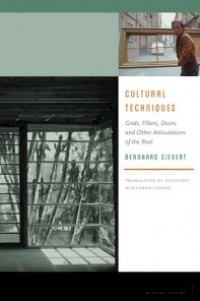
New York: Fordham University Press 2015, Series Meaning Systems, kart., 66 s/w Abb., 288 S., ISBN 978-0-8232-6376-9
In a crucial shift within posthumanistic media studies, Bernhard Siegert dissolves the concept of media into a network of operations that reproduce, displace, process, and reflect the distinctions fundamental for a given culture. Cultural Techniques aims to forget our traditional understanding of media so as to redefine the concept through something more fundamental than the empiricist study of a medium's individual or collective uses or of its cultural semantics or aesthetics. Rather, Siegert seeks to relocate media and culture on a level where the distinctions between object and performance, matter and form, human and nonhuman, sign and channel, the symbolic and the real are still in the process of becoming. The result is to turn ontology into a domain of all that is meant in German by the word Kultur.
Cultural Techniques comprise not only self-referential symbolic practices like reading, writing, counting, or image-making. The analysis of artifacts as cultural techniques emphasizes their ontological status as "in-betweens," shifting from firstorder to second-order techniques, from the technical to the artistic, from object to sign, from the natural to the cultural, from the operational to the representational. Cultural Techniques ranges from seafaring, drafting, and eating to the production of the sign-signaldistinction in old and new media, to the reproduction of anthropological difference, to the study of trompe-l'oeils, grids, registers, and doors. Throughout, Siegert addresses fundamental questions of how ontological distinctions can be replaced by chains of operations that process those alleged ontological distinctions within the ontic. Grounding posthumanist theory both historically and technically, this book opens up a crucial dialogue between new German media theory and American postcybernetic discourses.
“An excellent collection of essays from one of the most widely known and respected scholars of media, media theory, and cultural techniques working in Germany. The scholarship is erudite, sophisticated, and impressively wide-ranging.” Michael Wutz, Weber State University
“Cultural Techniques displays a stunning amount of historical knowledge, exploring texts and technological innovations that fall into fields such as the history of science, art history, architecture, cultural anthropology, ethnology, literary studies, and philosophy … Highly important” Edgar Landgraf, Bowling Green State University